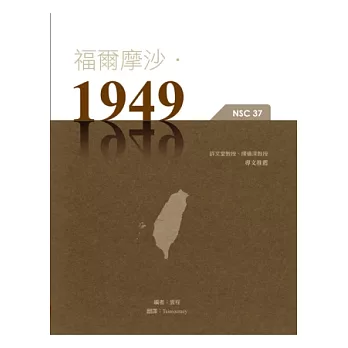The Book that Google bars.
Google 查禁的書:〈福爾摩沙 1949〉
【縛雞之論】英文拷到 G / D 找中文翻譯
Google, or more precisely its blog service "the Blogspot,"
barred the contents of my book "Formosa 1949" (福爾摩沙 1949) because of an anonymous report.
The book is about the public diplomatic documents of 1949 concerning Formosa in the Foreign Relations of the United States, edited by the U.S. Department of State. The net users can access those documents freely and easily.
The book
"Formosa 1949," which applied the ISBN, was published in 2014, is an
academic work with strict translations, verifications, and comprehensive
analyses. As the editor and an author, I
renounced the copyright and uploaded most of the content for the Chinese
readers, hoping that more people, especially scholars, utilize it.
Now
Google, with the corporate code of conduct "Don't be evil," bars the
book. Google accomplished it by its
unilateral rules, with no previous notice and no chance for the party concern
to explain.
I do not
blame Google. I blame Google's allowing
its Chinese employees to do things arbitrarily, especially things that concern
the freedom of speech and communications.
Most
international media agencies are not aware of one critical thing: Chinese
employees hinder the freedom of speech covertly.
For
example, The Voice of America (VOA) has had the Simplified Chinese version
alone for a long time. Its Chinese
readers from Hong Kong, Taiwan, Singapore, and North America, who are used to
the Tradition Chinese, is hard to comprehend Simplified Chinese.
The VOA
added the Tradition Chinese version by a conversion click on its website after
the petitions; however, the conversion soon is deleted a week later. The conversion re-appeared after further
petitions. And again, it disappeared
shortly after.
The
situation came back and forth many times, indicating that VOA's Chinese
Employees did not serve more Chinese readers but obeyed the ideology of the
Beijing tyranny.
After
years of petitions, the major international media websites have their
Traditional Chinese news reports, with readers' simple click of
transformation. Today, Simplified
Chinese can no longer monopolize the world media.
The
Google translation has a similar story.
It works appropriately between the major languages, such as English,
French, German, and Spanish; however, the translations become weird when it
concerns Chinese. It becomes
specifically bizarre between Chinese and Japanese: Words come from nowhere in
Chinese. That is particularly true in
the translation of articles with a political sense. At the same time, Google still translates the
original Japanese to English, or vice versa well. People can not stand Google's arbitrarily
translation service from Japanese to Chinese.
It is
hard to believe that Google allows its Chinese employees to decide who can
speak, which can be put out and add irrelevant words to the translation
arbitrarily. But we can almost be sure
that Google is so carelessly surrendering the civilized values and the code of
conduct "Don't be evil" to Beijing.
Google is
not the identical one that I trusted once.
翻譯軟體的翻譯
谷歌,或者更準確地說是它的博客服務“博客點”,因為一份匿名報告而禁止了我的書“福爾摩沙 1949”(福爾摩沙 1949)的內容。
這本書是關於 1949 年美國外交關係中有關台灣的公共外交文件,由美國國務院編輯。網絡用戶可以自由、輕鬆地訪問這些文件。
2014年出版的應用ISBN的《Formosa 1949》一書是一部經過嚴格翻譯、驗證和綜合分析的學術著作。作為編輯和作者,我放棄了版權,將大部分內容上傳給中國讀者,希望更多的人,特別是學者使用它。
現在,谷歌以“不作惡”的企業行為準則禁止了這本書。谷歌以單方面的規則完成了它,沒有事先通知,當事人也沒有機會解釋。
我不怪谷歌。我責怪谷歌允許其中國員工為所欲為,尤其是涉及言論和交流自由的事情。
大多數國際媒體機構都沒有意識到一件關鍵的事情:中國員工暗中阻礙言論自由。
例如,美國之音(VOA)長期以來一直只有簡體中文版。來自香港、台灣、新加坡和北美的中國讀者,習慣了繁體中文,很難理解簡體中文。
美國之音在請願後通過點擊其網站的轉換添加了繁體中文版;但是,轉換很快會在一周後被刪除。在進一步的請願之後,轉換再次出現。再一次,它很快就消失了。
這種情況反復多次,表明美國之音的中國員工沒有為更多的中國讀者服務,而是服從了北京暴政的意識形態。
經過多年的請願,各大國際媒體網站都有繁體新聞報導,讀者只需點擊一下就可以轉化。今天,簡體中文已經不能壟斷世界媒體了。
谷歌翻譯也有類似的故事。它可以在主要語言之間正常工作,例如英語、法語、德語和西班牙語;但是,當涉及到中文時,翻譯變得很奇怪。中文和日文之間變得特別奇怪:中文中的單詞從無到有。在翻譯具有政治意義的文章時尤其如此。同時,谷歌仍然將原來的日文翻譯成英文,反之亦然。人們無法忍受谷歌隨意將日文翻譯成中文的服務。
令人難以置信的是,谷歌允許其中國員工決定誰可以發言,可以將其放出並在翻譯中隨意添加不相關的詞。但我們幾乎可以肯定,谷歌如此不經意地將文明價值觀和“不作惡”的行為準則拱手讓給了北京。
谷歌不是我曾經信任過的那個。

沒有留言:
張貼留言
請網友務必留下一致且可辨識的稱謂
顧及閱讀舒適性,段與段間請空一行